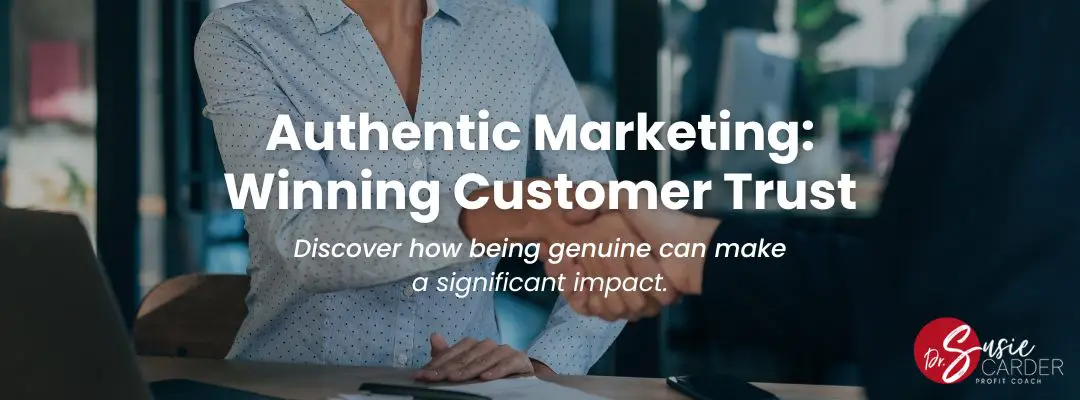What is Authentic Marketing?
If you’re keeping your finger on the pulse of the marketing world, you’ve likely heard about ‘Authentic Marketing’. What is it and why is it suddenly so important?
Authentic marketing is all about being real, being you, and telling your true story. This is in contrast to traditional marketing approaches that focus on pushing a product or a service. Instead of hard sell, it’s about connection, trust, building relationships, and creating a community around your brand.
In the digital age, people see so many ads and promotions, it has changed their behavior. Consumers tune out marketing messages and instead crave genuine engagements and authentic messages.
An audience can sense when a brand is genuine, and they reward that authenticity with their trust and loyalty. Let’s dive deeper and explore how embracing authenticity can truly transform your marketing game.
The Unmatched Impact of Authentic Marketing
Entrepreneurs, let’s dive into the unmatched power of authenticity in marketing. Discover how being genuine can make a significant impact.
Authentic Marketing Resonates with Consumers
First off, remember that today’s consumers are savvy – they can differentiate between genuine messages and exaggerated hype. Authentic marketing resonates because it speaks to their hearts.
When you share your brand’s true story, values, and mission, it creates a powerful connection. Consumers appreciate this honesty and transparency. Your customers will feel acknowledged, listened to, and appreciated. This connection is not only about selling but also about creating a meaningful relationship that will keep them coming back.
Fostering Relationships with Authentic Marketing
What authentic marketing does so beautifully is foster relationships. By being consistently genuine in your messaging and interactions, you’re not just another company trying to make a quick buck. You become a trusted friend, a reliable source of solutions.
Authentic marketing is about nurturing these relationships over time, valuing long-term customer engagement over short-term transactions. Your audience will genuinely feel a part of your brand’s journey, fostering a sense of belonging and community.
Driving Customer Loyalty with Authentic Marketing
Lastly, let’s address customer loyalty, the holy grail of business success. Authentic marketing plays a pivotal role in driving this loyalty. When you’re true to your brand and to your customers, they will reciprocate that honesty with loyalty. They’ll stick with you through thick and thin, become advocates for your brand, and contribute to your growth.
This authentic relationship you’ve cultivated won’t just weather a single transaction; it will last a lifetime. Authenticity in marketing is your secret weapon. Embrace it, champion it, and watch how it empowers your business.

Unveiling the Power of Authentic Content Marketing
I cannot overstate the significance of authenticity in content creation. Create authentic, relatable content that reflects your brand’s values and mission instead of just making sales pitches. Authentic content is the fuel that powers engagement, drives conversions, and builds a loyal customer base.
The influence of authenticity on the audience is profound. Authentic content resonates with the audience on a personal level, triggering a sense of connection and empathy. It provides them with a realistic portrayal of your brand, free from fluff and exaggeration.
This transparency builds trust and credibility, which are crucial foundations for any brand’s success. When your audience trusts you, they listen to you, engage with you, and ultimately choose to support your brand.
In contrast, content lacking authenticity can feel contrived and may alienate your audience, diluting your brand’s impact.
What is the authenticity strategy in marketing?
The authenticity strategy in marketing is a consumer-centric approach that prioritizes genuine, transparent, and honest communication with customers. This strategy fundamentally understands and respects the intelligence of the consumers and does not seek to manipulate them with misleading or false claims.
Instead, it presents the products or services in their true light, emphasizing genuine value and benefits. Authentic marketing seeks to build a strong, trusting relationship with customers, establishing a brand as reliable and transparent. This strategy is increasingly important as consumers become more discerning and demand honesty and integrity from the brands they support.
Case Studies in Authentic Content Marketing
Delving into real-life examples can be a powerful way to understand the impact of authenticity in marketing. We examine three successful businesses that have effectively used authentic marketing strategies. These strategies have helped them connect with customers, build relationships, and establish a loyal customer base.
Dannijo
Dannijo, a jewelry brand, has set a high bar with its authentic marketing strategy. Instead of using forceful sales tactics, they chose a different approach. They decided to share their lives, showcase famous people wearing their jewelry, and share interesting stories.
This unique approach has made their brand popular not only among the rich and famous but also with everyday people. By being genuine and fostering connections, Dannijo has successfully built a loyal customer base.
Krochet Kids
Krochet Kids is a shining example of embracing authenticity in their marketing strategy. This non-profit organization produces simple, high-quality, hand-crafted, and affordable clothing and accessories like T-shirts, hats, and bags. But their impact goes beyond just products. They have a unique model that empowers women in Northern Uganda, India, and Peru, providing them with the assets, skills, and knowledge to uplift themselves and their families out of poverty.
Krochet Kids is a socially conscious brand that proves there’s more to a company than its founders or its offerings.
93 Play Street
93 Play Street, a brand created to provide fashionable and functional swimwear, takes a similar approach. By actively engaging with customers, and addressing their needs and feedback, they continuously work towards improving their products. It’s not just about selling swimwear; it’s about fostering a community around the brand, where customer input is valued and incorporated into their offerings. They use social media as a platform to showcase authenticity in their marketing efforts.
These cases highlight the power of authentic marketing. They show that being real, honest, and human in marketing practices can establish a deeper connection with customers and drive long-term success. As a business owner, embracing authenticity in your marketing strategy can help you create meaningful engagement, build trust, and foster customer loyalty.

Cultivating Consumer Trust with Authentic Marketing
Authentic marketing is a powerful tool for building consumer trust. Trust is the bedrock of any relationship, including that between a brand and its consumers. When consumers trust a brand, they are more likely to engage with it, buy from it, and recommend it to others.
Authentic marketing, at its core, fosters this trust. It demonstrates to consumers that a brand is truthful, reliable, and transparent in its dealings – key ingredients for building trust.
Authentic marketing also personalizes the brand, making it more relatable and approachable. When consumers feel that a brand understands them and caters to their needs and aspirations, they are more likely to trust it. Authentic marketing can also amplify a brand’s expertise and credibility, further instilling trust.
Here are some tips to ensure authenticity in your marketing message:
- Be True to Your Brand: Your marketing message should reflect your brand’s values, mission, and personality. Strive for consistency across all your marketing communications.
- Communicate Transparently: Be open and transparent in your communications. Honesty can go a long way in fostering trust.
- Engage with Your Audience: Encourage dialogue with your audience. Listen to their feedback and respond accordingly.
- Show Empathy: Understand your audience’s needs, challenges, and aspirations. Tailor your message to address these aspects.
- Tell a Story: Share your brand’s journey, its successes, and its failures. This humanizes your brand and makes it more relatable.
- Provide Value: Ensure that your marketing message provides value to your audience. This can be in the form of useful information, insightful advice, or engaging stories.

- Keep Cash Flowing In
- Build a Foundation for Long-Term Profitability
- Learn to Thrive No Matter What Happens
The Future of Authentic Marketing
In the fast-paced and ever-evolving landscape of social media marketing, how will authenticity shape and influence future trends? As we move forward, the role of authenticity in marketing will only deepen and expand.
Consumers aren’t just buying a product or service, but a brand experience. This experience, defined by authenticity and trust, is becoming a key determinant of consumer behavior.
In the realm of social media, authenticity will continue to be the currency that sets successful brands apart. Businesses that can consistently communicate their brand values and stories in an honest and relatable way will be the ones capturing audience attention and loyalty in the increasingly competitive social media space.






